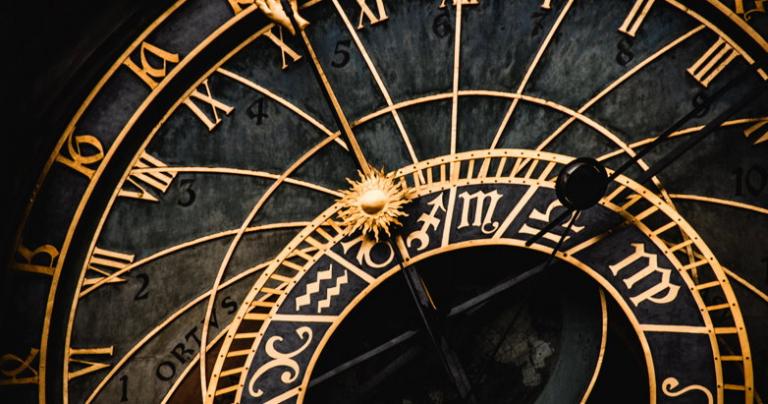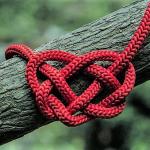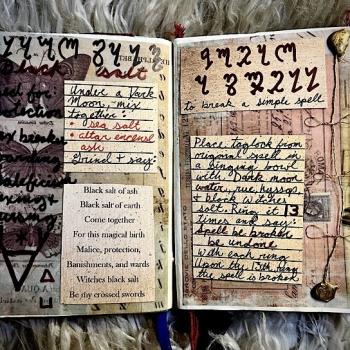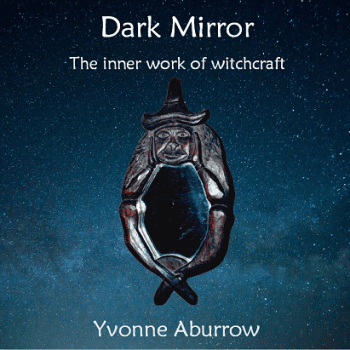Hello, beautiful creatures. Sometimes, when I’m in conversation with folks who aren’t particularly p-wordish, I’m asked what witchcraft is. It’s a reasonable question, and I wish I had an easy answer, or at least one that didn’t require a lot of specialized jargon to deliver1.
What I find is that, rather than a definition, what I have are memories, feelings, impressions, and experiences, all of which add up to something elusive, inexpressible, ineluctable. The following is an attempt, in four parts, to capture something of what I mean when I call myself witch, when I name what I do witchcraft.

Even as I acknowledge the necessity, I resent it just a little.
It’s a muggy afternoon some years back, and I’m on a break from work, quietly having an emotional meltdown. I’ve just received some news from a relationship partner, stomach-clenchingly awful news with the potential to destroy more than one relationship, more than one life. I stumble outside, behind the office, and set to work, unthinkingly, without a plan. A length of string, a handful of twigs, some saliva, a drop of blood. For incense, I have a cigarette, half of which I share with the spirits as an offering. The words come unbidden, unrehearsed. And then, just like that, it’s done. No matter that my materia magica is quotidian and mundane, or that my prose stumbles and falters, or even that I’m filled with uncertainty about the working itself. The spell is spun, the spell is released.
The situation unravels, and no lives are destroyed. Not long afterward, the relationship also unravels. It withers and dies. Some hearts are bruised, some are broken. Life goes on.
It’s a Saturday evening, and I’m sitting on the sidelines of a large-scale public ritual performance. My partner and I are cuddling with our drowsy daughter and doing what we can to help hold the space. As the music swirls and builds, the priestess embodies the goddess and leads the room into movement. First, there is gentle swaying, then spiraling motion, and finally a clustering. She has invited them to a crux, a crossroads, and they have cheerfully joined her there, gathering to embrace whatever the goddess has shown them.
Well, most of them, anyway. I notice someone who has fallen away from the main throng, sitting to one side, crying silent tears through clenched eyes. I shift my daughter to my partner’s shoulder, then approach the distressed person as gently as I can. We talk quietly. They take my hand, and I put an arm around them. The power in the ritual is still swirling around and through them. We talk some more, and the swirling subsides, abates. They dry their tears, and we laugh a little. As the ritual ends, they thank me, then walk off to keep an appointment at their own crossroads, head held high.
It’s the dead of night in the final days of a romance long since turned sour, and I am naked and alone. I’ve rolled away the futon mattress in the room I’m sleeping in, now that my ex and I have separated, to make enough space for ritual. In my hands, I hold a knife ritually consecrated to the work. A single candle burns in the room, casting only enough light to distinguish shapes. I kneel on the floor, invoking a goddess whose name was ancient when my ancestors were young, and I state my boon as clearly and concisely as I can. Following an instinct whose origin I can only speculate about, I lay my knife on the floor before me, as though laying it at her feet. I feel something pop and release within me, as though a too-taut guitar string has just snapped and unwound. I begin to cry, then, first in hitching convulsions, then in wracking sobs, making an offering to the goddess with the salt and water of my body.
I wake the next morning, not painless, but at peace with my pain. I walk through my work day, thinking about the previous night’s work, bemusedly wondering what my coworkers would make of it.
What is witchcraft? It’s what witches do. It’s as mundane as the mail, as everyday as eggs and toast, and yet it crosses the hedge between the quotidian and the numinous. It’s traces of scented oil and sweat on skin, it’s blood and saliva mixed with dirt. It’s making an offering of your own pain to the gods, laughing through your own tears. It has its own glamour, and as often as not it’s a smudgy, filthy mess. It’s what we do to work our will, to make it through the day, to avert or enact disasters. It is an art of changing reality, of bending the world to your will, and it is in no way safe. Witchcraft can demand sacrifice… indeed, it will demand sacrifice: time, power, breath, effort, tears, sweat, even blood.
Witchcraft is what witches do… and if you are yourself a witch, you’ll know it when you do it.
Until next time, dear ones, choose your deeds wisely. ♥
- From a previous post of mine: “I use the term ‘witchcraft’ to refer to an ambiguous but quantifiable category of magical practice rooted in, and derived from, a cosmological schema defined in part by the network of relationship(s) between the practitioner and the forces with which the practitioner treats, including the natural world. While the ‘witch’ qualitatively differs from the ‘sorcerer’ or the ‘magician,’ it can be difficult to elucidate that difference without resorting to such sophistries as ‘I know it when I see it.’ Perhaps the best distinction which can be drawn is that, while all three categories of practitioner treat with spirits, the witch tends towards a relationship of equity and partnership with such spirits, whereas the magician and sorcerer tend more towards relationships defined by hierarchy and authority.” I mean, ugh, right?
















